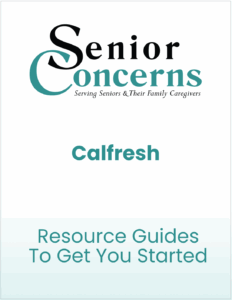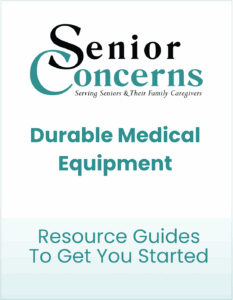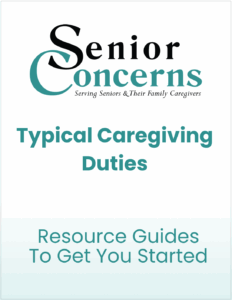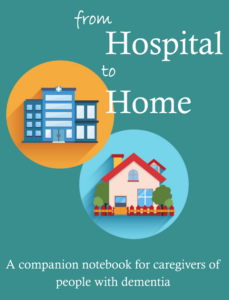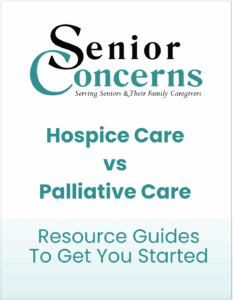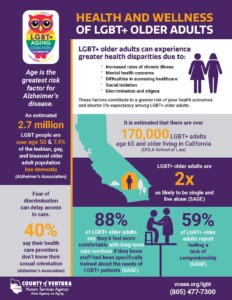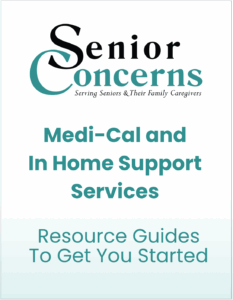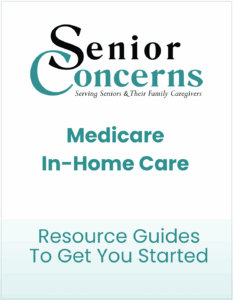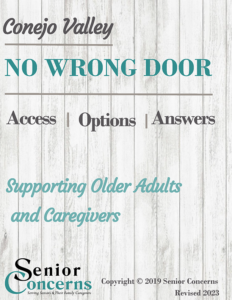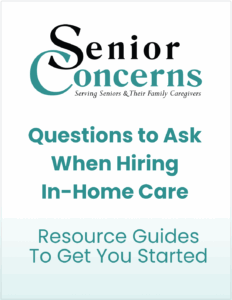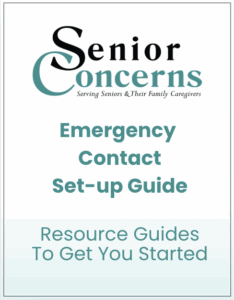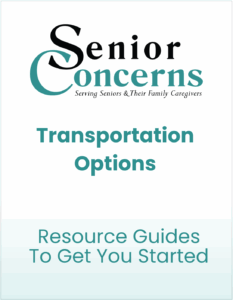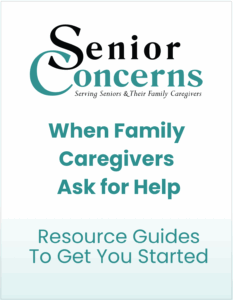Welcome to Senior Concerns’ Collection of Resources

Senior Concerns has begun compiling a collection of downloadable resources for your use. These are starting points and guides to help you think through your needs.
However, the best resource is always talking to one of our trusted staff! Call us to talk through these resources so we can best guide you based on your individual needs.
We are just a phone call away! 805-497-0189
CalFresh is the California implementation of the federal Supplemental Nutrition Assistance Program, formerly known as the Food Stamp program, which provides financial assistance for purchasing food to low-income California residents.
Durable Medical Equipment (DME)
Medicare will typically pay for medically necessary and prescribed DME to treat a medical condition. Some examples of DME covered by Medicare include: Crutches, wheelchairs, hospital beds, walkers, oxygen equipment, CPAP machines, blood glucose monitors, insulin pumps, nebulizers, traction equipment, scooters, prosthetics, urinary catheters.
Engaging Activities at Home
Taking part in activities and everyday tasks can provide benefits for both the physical and mental well being for someone with dementia. While activities can help someone stay active and healthy, they can also help express feelings, retain skills and improve self esteem. They can also serve as opportunities for caregivers and their loved one to connect and do enjoy activities together.
Financial Resources
Senior Concerns has compiled this collection of resources that may provide support or information to assist you in your financial needs.
FooFood Help Resources
There are a variety of resources to help people secure food for their households.
A companion notebook for caregivers of people with dementia
Research indicates that people with Alzheimer’s disease and dementia have twice as many hospital stays per
year as other older people, requiring family caregivers to be able to effectively communicate with the healthcare team while their loved one is in the hospital, and understanding how to provide follow up care once the elder is transitioned to the home. More often than not, the patient with dementia is unable to effectively communicate their needs and wishes to hospital staff. The family caregiver becomes stressed trying to keep track of everything they need to tell the hospital staff to ensure their loved one is properly cared for.
To help open the lines of communication between family caregivers and hospital staff, and to help ensure the best possible transitions from hospital to home, grant funding has enabled Senior Concerns to develop the “From Hospital to Home: A companion notebook for caregivers of people with dementia.”
The Hospital to Home notebook provides a form called “All About Me” for the caregiver to fill out including information about the patient, how they best communicate, what can help when providing care. The caregiver can post this next to the bed to alert any person who enters the room about how to approach the patient.
The notebook not only provides practical information and resources for the caregiver including a medication log, home safety information, common challenges for people with dementia and a resource list, but it also teaches the caregiver how to be a patient advocate. The most important resource for any person with dementia is their caregiver. This notebook hopes to empower the caregiver to ask questions, to advocate for care and to create the best situation and experience for their loved one with dementia.
Download Ventura County Notebook
Descargar Condado De Ventura Cuaderno En Espanol
Individual Downloadable Pages:
Hospice Care vs. Palliative Care
Hospice and palliative care both include interdisciplinary teams that come to the home with the goal of providing comfort, stress reduction, and physical and psychosocial relief.
Download your copy of “Hospice Care vs. Palliative Care” here.
LGBT+ Aging Coalition: Health and Wellness
Research reveals a number of crucial insights about the health and wellness of LGBT+ older adults.
This document outlines services typically offered by home care agencies. It is intended as a reference to help you maximize the benefits of private in-home care.
Please note that service availability varies, and we recommend consulting your specific agency to confirm they provide the services you need.
Download your copy “Licensed Home Care Agency Services” here.
Medi-Cal & In-Home Supportive Services
Medi-Cal is California’s Medicaid healthcare program that provides comprehensive health coverage for people with low or no income. IHSS is a program under Medi-Cal that can pay for help in the home. The Human Services Agency helps seniors with low incomes and people with disabilities (including children) stay in their own homes instead of moving to residential care facilities.
Download your copy of “Medi-Cal & In-Home Supportive Services” here.
Medicare In-Home Care
Medicare does not typically cover most in-home care services unless they are deemed medically necessary and ordered by a doctor. Examples of covered services may include skilled nursing care, physical therapy, and occupational therapy. Medicare may also cover some medical equipment and supplies needed for in-home care.
No Wrong Door
As your trusted guide to services for older adults and family caregivers, Senior Concerns staff knows how to navigate a wide-variety of community resources. This No Wrong Door guide demonstrates the many organizations and programs that our staff can help you understand, and what will best support you in your journey.
Questions to Ask When Hiring In-Home Care
Hiring a caregiver is a beautiful thing to do for a loved one, but it also carries tremendous obligations and burdens because you have now become an employer. It is therefore imperative that you understand your legal obligations.
Download your copy of “Questions to Ask When Hiring In-Home Care” here.
In an emergency, every second counts-especially for older adults. If you are hurt, feeling unwell, or unable to speak, having an ‘In Case of Emergency’ contact on your phone ensures that first responders can quickly reach someone who knows your medical history, medications, and wishes. It gives your loved ones peace of mind, helps doctors make faster, safer decisions, and makes sure you are never alone in a crisis. Setting up your emergency contact only takes a minute, but it could make all the difference when you need help the most.
Download instructions for adding your contacts to your phone HERE.
Typical Caregiving Duties
Listing and reviewing these tasks is crucial as it sets clear expectations over the scope of responsibilities, maintains accountability for agreed upon duties and creates efficiency when specific tasks are outlined. Having a formal task list can protect both parties in case
of dispute or disagreements.
Transportation Options
Several transportation options are available for seniors throughout the Conejo Valley.
Caring for a loved one with dementia is a profound act of love — but it can also be exhausting and overwhelming. Many caregivers wait too long before asking for help. The resource page below can help you recognize triggers early to help you reach out before a crisis point.


